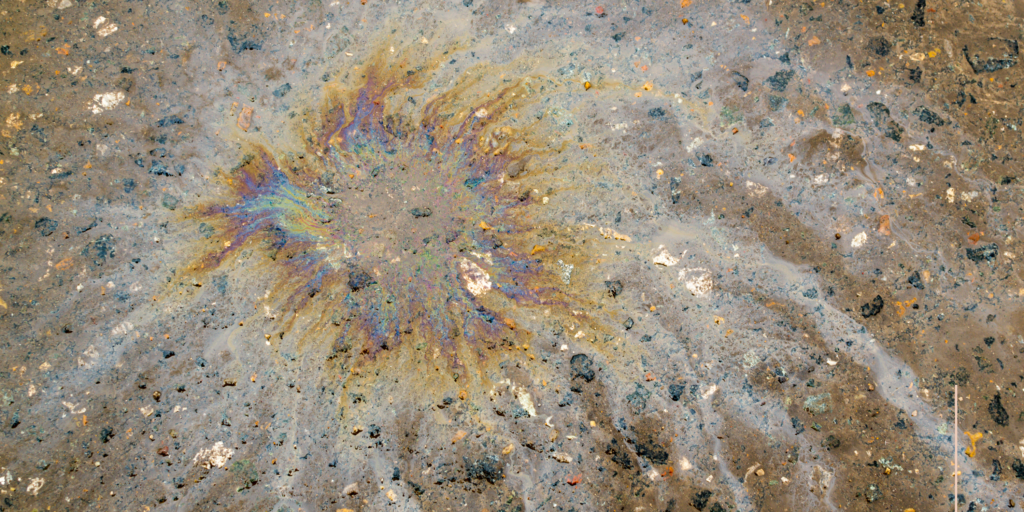Managing oil spills on asphalt driveways or parking lots is of utmost importance for several reasons: The management of oil spills on asphalt driveways or parking lots is of utmost significance for several reasons:
- Oil spills can cause much harm to the asphalt surface, and as a result, it could be very costly to fix or replace.
- Oil spills are dangerous to the environment because they can damage the soil and water.
- The oil spills on asphalt surfaces can be dangerous for pedestrians and vehicles, thus creating slippery conditions that increase the chance of accidents.
This article will cover the causes and consequences of oil spills on asphalt surfaces, removal methods, preventative measures to keep spills from happening, the best products to use if a spill occurs, and the advantages of hiring professionals to do the work.
Understanding the Causes of Oil Spills on Asphalt Driveways or Parking Lots
The oil can spill on asphalt driveways and parking lots for different reasons. The most common reason for oil spills is vehicle leaks when oil or another liquid is dropped to the ground while the car is parked or moving. Other reasons may be wrong handling of the oil containers during refueling or maintenance activities and unintentional spills during transportation.

The effects of oil spills on asphalt pavements can be detrimental:
- The oil seeps into the asphalt pavement structure, weakening and eroding in the long run. Thereby, the roads develop cracks and potholes and overall worsen the infrastructure.
- Oil stains are unsightly, tough to remove, and can ruin the entire area’s appearance.
- Oil spills will be slippery, and there is a chance of accidents for pedestrians and vehicles. In oil spills, the soil and water sources around may get polluted, affecting the environment and its wildlife.
Effective Techniques for Cleaning Oil Spills on Asphalt Surfaces
Oil spill cleanups on asphalt driveways or parking lots must be done systematically. Here is a step-by-step guide to effectively clean oil spills: Here is a guide on how to clean oil spills in a step-by-step manner:
1. Contain the spill: Use absorbent material like cat litter or sawdust to stop the spill from spreading.
2. Remove excess oil: Use a shovel or a scraper to remove the oil left over on the surface.
3. Apply a degreaser: Opt for the most suitable cleaning agent for asphalt surfaces. Spray the right amount of product on the area that has a problem with it, and then be patient enough to give it the time it requires.
4. Scrub and rinse: using a stiff brush or a broom to scrub the degreaser down into the asphalt surface may help to loosen the oil stain. Ensure you rinse the area well with the running water to remove the oil residue and the degreaser.
5. Repeat if necessary: This may not be the last time you will have to use this method, or you may have to select a stronger degreaser for the most stubborn stains.
Do not, however, use strong chemicals or solvents, which can, in turn, cause the asphalt to be damaged. Rather than that, it is more advisable to use eco-friendly degreasers, which are specifically designed for asphalt cleaning. Moreover, you can choose soft brooms or brushes to eliminate the possibility of tearing or wearing out the pavement.
Understanding the Necessity of Selecting the Proper Products for Dealing with Oil Spills on Asphalt Surface
Suitable products should be selected for the proper oil spill cleanup on asphalt surfaces since many products available on the market are used for this purpose. Here are some of the considerations to be made when selecting oil spill management materials. Here are some factors to consider when selecting oil spill management products: Listed below are some of the factors that you should take into account when choosing oil spill management products.
1. Compatibility with asphalt: Select the goods specifically designed to be used on asphalt areas.
2. Absorbency and effectiveness: Take note of the absorbency levels of the products and their capability to remove oil stains from paved areas.
3. Environmental impact: It is advisable to use safe products for the environment; therefore, select biodegradable ones that are free from harmful chemicals to plants, animals, and water sources.
4. Ease of use: Pick the products that are user-friendly and come out after washing. This choice will save time and reduce the effort of oil spill management and will be an excellent example for other oil companies.

Asphalt surface spill management is one of the recommended products’ applications, along with absorbent pads or rolls, granular absorbents, and spec, and realized degreasers formulated for asphalt pavements. It is advised that such equipment should be immediately available in the required quantities for the companies to be able to react quickly to the oil spill disasters.
DIY techniques could be appropriate for small oil spills. Nevertheless, there are instances where it is more advisable to hire a professional oil spill management service.
Additionally to the list of factors to consider when deciding on the industrial service provider to be hired for oil spill cleanup on asphalt surface, reputation, experience, and certifications are also worth mentioning. Insurance plans are a security buffer against uncertainties, and testimonials from happy customers are a great way to get more referrals.
The correct oil spill response is the key to asphalt driveways and parking lots that want to protect the surface from damage, avoid environmental contamination, and ensure the safety of pedestrians and motorists. The causes and consequences of oil spills are clear. Practical ways to reduce marine pollution are applied. Oil spills treatment consists of several stages, certain chemicals and equipment. The most significant factor is the selection of products that can be used in the cleanup of the spill. There are instances where the only option is to hire the professionals to do the cleanup according to the standards. By implementing good preventive measures for oil spills and acting promptly to resolve any issues that arise, you can extend the life of your asphalt surfaces and preserve the environment around you.

